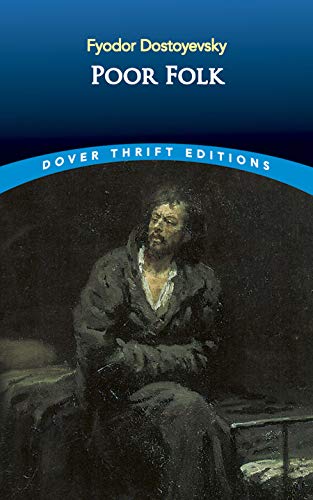Poor Folk (Dover Thrift Editions
Classic Novels)
Fyodor Dostoyevsky
BOOK REVIEW

In the shadowy corridors of 19th-century St. Petersburg, where the specter of poverty looms large, Poor Folk emerges as a haunting testament to the human condition. Fyodor Dostoyevsky, that maestro of psychological depth, invites you into a world rife with desperation and longing, painting a portrait of love and suffering that resonates with a staggering intensity. This novella, although often overshadowed by Dostoyevsky's later masterpieces, serves as a profound exploration of the human soul's struggle against the throes of destitution.
As you delve into this work, be prepared to confront not merely the struggles of the destitute but your own perceptions of wealth, integrity, and compassion. Dostoyevsky crafts a narrative that compels you to feel the weight of the characters' burdens, illuminating the tender spaces where despair and hope collide. The story unfolds through a series of poignant letters exchanged between the two main characters, Makar Devushkin and Varvara Dobroselova. Their correspondence, laced with both vulnerability and resilience, exemplifies the depth of emotion that Dostoyevsky is famed for-each word a heartbeat, each sentiment a painful reflection of their circumstances.
You might feel the air thick with emotion as Makar, a humble clerk, lays bare his soul in the letters he pens to Varvara, revealing his tormented love for her amidst the harsh realities of their existence. His struggles to provide for her, to uplift her spirits, create a visceral depiction of poverty that transcends mere economic hardship-it's an indictment of societal indifference. The intensity of his longing strikes a chord within you, igniting feelings of empathy that force you to confront the inherent injustice of their plight.
While Poor Folk may be a short novel, every page is laden with existential questions that demand your attention. Dostoyevsky, through Makar's letters, invites you to contemplate the essence of human connection amid dire circumstances. As readers, we are thrust into a world where the lines between social classes blur, revealing a shared humanity often obscured by economic divides. The narrative prompts reflections on kindness, the search for dignity, and the devastating impact of poverty-a mirror reflecting society's moral fabric.
Critics have lauded Dostoyevsky for his ability to seamlessly intertwine philosophical thought with the rawness of human emotion. Some argue, however, that the letter format might limit the narrative's scope, rendering it claustrophobic. But perhaps that's precisely the point; it's a pointed reminder that the struggles of the impoverished are often enclosed within the walls of their own existence, desperate for a glimpse of hope, yet often met with oppressive silence.
Dostoyevsky's exploration of social themes resonates profoundly, echoing beyond the confines of his time into the tumultuous currents of contemporary society. The questions he raises are as relevant today as they were over a century ago: How do we address the systemic inequalities that persist? How do we empathize with the unseen struggles of those around us? In our often-screened existence, Poor Folk serves as a clarion call, urging you to awaken your sense of social responsibility.
You may be surprised to find that the emotional impact of the characters' plight lingers long after the final letter has been read. Readers have described the novella as a gut-wrenching journey, leaving them haunted by the stark realities it presents. The depth of despair encountered within these pages prompts you to re-evaluate your understanding of wealth and worth-invoking a profound sense of moral obligation toward your fellow beings.
Poor Folk is not simply a tale of suffering; it's an exquisite examination of how love flourishes in the face of adversity. It's the tender moments that cut through the heart of hardship, where moments of tenderness illuminate an otherwise bleak existence. By immersing you in Makar and Varvara's fragile, yet poignant relationship, Dostoyevsky illustrates that even amidst the darkness, love remains a beacon of hope.
You are left grappling with the harsh truths of existence, wondering if compassion can bridge the chasms created by circumstance. Dostoyevsky's narrative transcends mere storytelling; it urges you, the reader, to feel, reflect, and ultimately act. Perhaps, in understanding their plight, we are compelled to push back against the tide of indifference that can so easily swallow us whole.
As you journey through Poor Folk, embracing both the exquisite beauty and the shattering despair of Dostoyevsky's prose, know this: every line is a call to recognize the humanity in those we often overlook. By the end, you may find the urgency to engage with the world around you, armed with a newfound empathy that refuses to turn a blind eye.
In the end, it's a delicate dance between the mundane and the profound-a reminder that you cannot simply walk past the suffering of others. This novella is a challenge to your very core, urging you to emerge from the shadows and take up the mantle of compassion in a world that often feels devoid of it. Don't just read Poor Folk; let it evoke the ferocity of your emotions and inspire a commitment to change, however small it might seem in this sprawling universe. 🌍✨️
📖 Poor Folk (Dover Thrift Editions: Classic Novels)
✍ by Fyodor Dostoyevsky
🧾 112 pages
2007
#poor #folk #dover #thrift #editions #classic #novels #fyodor #dostoyevsky #FyodorDostoyevsky